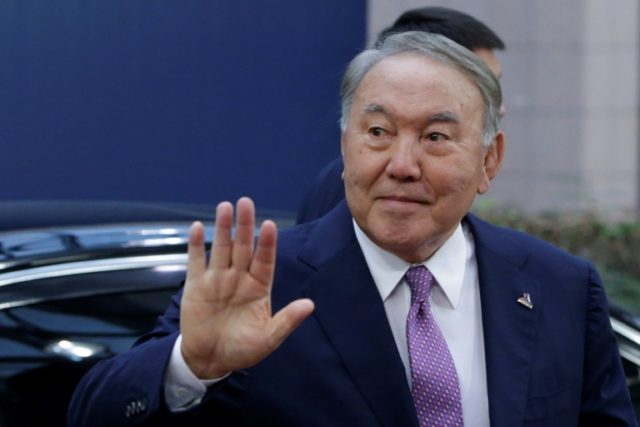The Central Asian nation of Kazakhstan was rocked on Tuesday by the surprise announcement that longtime President Nursultan Nazarbayev has decided to resign after 30 years in power.
On the surface, Nazarbayev’s resignation appears to be little more than a 78-year-old man deciding to semi-retire while keeping a hand in the family business, which happens to be ruling a country and owning a good deal of it.
He handed off the presidency to a handpicked successor, who was sworn in the day after Nazarbayev announced his retirement, but retained other offices, including chairmanship of the national security council, leadership of the only real political party in the country, and the honorary title of “Leader of the Nation.”
The new president, former senate leader Kassym-Jomart Tokayev, promptly renamed the capital city of Astana to “Nursultan” in the retiring leader’s honor and named Nazarbayev’s daughter Dariga his replacement as speaker of the Senate. 55-year-old Dariga Nazarbayev is seen as her father’s most likely successor after Tokayev serves out the remainder of the old man’s current term and something resembling an election is held in 2020.
Nazarbayev is a former Soviet Communist official who took office shortly before the collapse of the USSR. He ruled as an autocrat in the model of his close ally Vladimir Putin, endlessly returning to office in sketchy elections where he took over 97 percent of the vote, while his opponents took multiple gunshot wounds. There are no term limits on his office, the Kazakh parliament having removed them in 2007. He has also been very friendly to China, which plans to incorporate oil-and-mineral-rich Kazakhstan into its Belt and Road trade and infrastructure program.
Western media hailed the outgoing Nazarbayev as a relatively enlightened despot who won praise for “maintaining stability and ethnic peace in Kazakhstan,” as the Associated Press put it.
“Even though he has faced criticism for sidelining the political opposition and creating what is effectively a one-party state, the political regime that Nazarbayev has built is more liberal than the de-facto dictatorships in neighboring Central Asian countries,” the AP continued.
The AP was cynical enough to quote Central Asia analyst Arkady Dubnov’s speculation that Nazarbayev positioned his daughter as his successor to “secure the personal safety and business interests of his family.”
Those interests are vast. Kazakhstan is renowned for its corruption, and a great deal of the graft flows through the ruling family’s coffers. When Nazarbayev’s youngest daughter Aliya visited Egypt a decade ago, she didn’t just bring back souvenirs – she built a replica Egyptian temple in Kazakhstan.
Dariga Nazarbayev’s grandson Nurali figured prominently in the Panama Papers, the 2016 expose of offshore tax havens. Nurali “inherited” vast wealth and business assets before he was 20 years old when his father fell out with President Nazarbayev, fled the country to escape what he called politically motivated felony charges, and eventually hanged himself in an Austrian jail cell.
The Nazarbayev family has been accused of treating Kazakhstan’s banks, financial funds, and corporate assets as their own private treasure vault. Former British Prime Minister Tony Blair was engulfed in scandal in 2016 when it was discovered he signed a multimillion-dollar deal to advise Nursultan Nazarbayev for most of the 2010s.
The UK Guardian speculated on Tuesday that Nazarbayev’s departure from the presidency could provide a roadmap for his old friend Vladimir Putin, who might be looking for a way to vacate the Russian presidency on his own terms without truly relinquishing power.
Al-Jazeera quoted analysts who believe Dariga Nazarbayev will be made comfortable while her father effectively rules from behind the scenes, but his true successor will be his nephew Kairat Satybaldy, currently deputy head of Kazakhstan’s Committee for National Security, an organization descended from the old Soviet KGB. According to these theories, Satybaldy’s resume greatly resembles Putin’s and Putin has already given his quiet approval for Nazarbayev to install his nephew in the presidency.
Despite the seemingly placid nature of Nazarbayev’s retirement and the tremendous power the old despot will still wield behind the scenes, Kazakh and Russian stock markets grew surprisingly nervous when the news broke. This could be partially a result of every oil-based economy becoming apprehensive as global oil prices plummet, jitters exacerbated in Kazakhstan by recent production problems. Also, Nazarbayev saw fit to fire most of his top officials before resigning himself.
Another cause for market concern in Moscow is the fear that Nazarbayev is setting up the board for a new “great game” where China and Russia bid for Kazakhstan’s affections. More precisely, the game has been running for several years, but Kazakhstan might be preparing to make some big moves. Forward-looking analysts believe it will soon become impossible for Kazakhstan to remain perfectly balanced between Russia and China.
Some believe Putin will make a move to bring Astana – sorry, make that “Nursultan” – more firmly into Moscow’s orbit before China can make a deal with the ruling family. If Putin was waiting for Nazarbayev to shuffle off before making his play, Tuesday’s ceremonial retirement might be an invitation for both Moscow and Beijing to ante up.

COMMENTS
Please let us know if you're having issues with commenting.